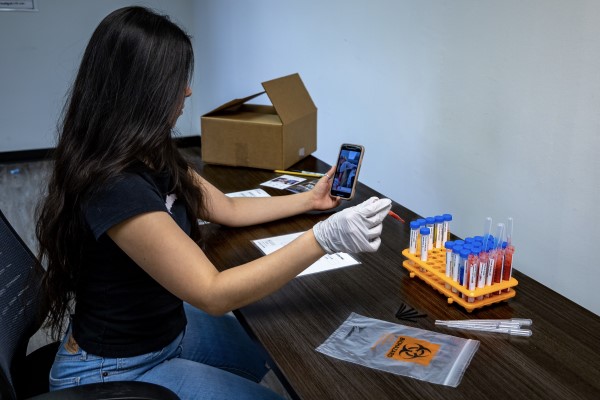COVID-19 Drives Innovative Approach to Career Exploration
Published Sep 18, 2020 by Susan Moore
When schools paused classroom learning and on-campus activities and businesses limited the number of individuals allowed in their offices and facilities due to the COVID-19 pandemic in the spring, it disrupted the various approaches used to introduce students and parents to good careers in Houston. Job and career fairs, internships and hands-on lab work all went on hiatus.
Effective career exploration and internship opportunities are essential in helping students recognize a wealth of career options and choices and connect to the education and skills pathways for those careers. According to WorkingNation’s recent American Workers Survey, 31 percent of adult workers say they never spoke with a parent or teacher when they were younger about their career plans and how to achieve them.
Providing opportunities for students to explore and try out careers and learn from industry professionals can have a profound effect on those students’ lives. They not only help students recognize otherwise unknown career options but also help them make informed education and career decisions. Studies from the Brookings Institution show that low-income youth were much more likely to be working in a well-paying job by the time they were adults if they had been involved with “relationship-based career and technical education programs” that involved work-oriented mentorship from an adult.
“Enabling students to try out careers is instrumental to helping them identify and follow career pathways that lead to good lives for them and for their families. Many of UpSkill Houston’s employer partners understand the importance of and support efforts that provide access to career-connected learning opportunities,” said Peter Beard, who, as the Partnership’s senior vice president of Regional Workforce Development, leads the Partnership’s UpSkill Houston initiative.
As schools and businesses adapted in order to carry on operations, so have career exploration programs.
BridgeYear is one of them. The nonprofit and UpSkill Houston initiative partner connects underserved youth to careers and education beyond high school. BridgeYear had to rethink its immersive Career Test Drive® (CTD) Fair approach to career exploration while staying true to its hands-on model. In about three months, the organization shrank its in-person program into activities that fit inside 12-inch by 12-inch by 6-inch boxes – or even smaller envelopes – and could be delivered directly to students’ homes.
BridgeYear piloted its new Career Test Drive® Kits with 49 students this summer and is currently building
1,500 more for school distribution in October.
“Students need hands-on experiences to ‘try on’ and make sense of careers rather than just hearing abstractly about them,” said BridgeYear co-founder and Executive Director Victoria Chen.
During an average BridgeYear CTD Fair, about 200 to 300 students work through CTD Modules set up in a school gymnasium to try their hands at high-growth, high-demand careers ranging from web developer to HVAC technician to phlebotomist while learning about the steps needed to enter the field. Since its founding in 2016, the organization has engaged more than 15,000 students through the fairs and its Advising program.
Prior to developing the pilot, BridgeYear held listening sessions with high school college and career counselors to understand the realities and challenges of counseling, including connecting with students for scheduled sessions and making personal connections with new students through a virtual medium. The BridgeYear team members determined CTD Fairs were unlikely to continue this fall, and they wanted to help the counselors overcome the new challenges of distance learning. The BridgeYear team drew inspirations from consumer brands like Blue Apron, Warby Parker and Stitch Fix, which offer a service and products tailored to the individual and sent right to customers at home. (“We like having a personalized box shipped right to our door to help us make decisions,” Chen said about the consumer trend.)
Each Career Kit comes with materials needed to complete a simulation. Students then attend one-hour virtual sessions with an industry professional to discuss the activity and next steps along the career pathway, such as post-secondary programs.
Unlike BridgeYear’s fairs, which feature six careers out of 17 the organization highlights, kits are industry-based and introduce students to two different in-demand careers in each industry. One activity mimics a laboratory setting and another an administrative or desk setting. The Healthcare Career Kit, for instance, features a medical laboratory technician simulation that challenges students to identify a patient’s blood type and then assess whether potential donors are matches, and the health information technician simulation features aspects of billing and coding. Another example is the Construction & Design Career Kit, which includes an electrician simulation requiring students to connect a light bulb to two different switches. Students must also design a kitchen layout in the designer simulation while learning guidelines set by the National Kitchen & Bath Association (NKBA), a corporate sponsor.
Each Career Kit also comes with an instructional video, which is filmed in a TikTok style, showing a near peer engaging with the kit and its activities for a more youth-focused approach to instruction and career exploration.
Chen said more than 80 percent of the students who participated in the summer Career Kit pilot reported that they were interested in one of the careers they tested. She believes the kit activities helped students verify their career choices in industries they were already interested in.
BridgeYear currently offers two Career Test Drive® Kits but is working with – and seeking – new partners
to develop more experiences and highlight careers in other industries. The organization seeks industry volunteers for its Advising LIVE sessions as well as corporate partners that can provide kit materials or logistics support.
Learn more about the program at BridgeYear.org.
UpSkill Houston works with employers, educators and community-based leaders to strengthen the talent pipeline our region’s employers need and to help Houstonians connect to good jobs that increase their economic opportunity and prosperity.
 The Houston Report
The Houston Report


















